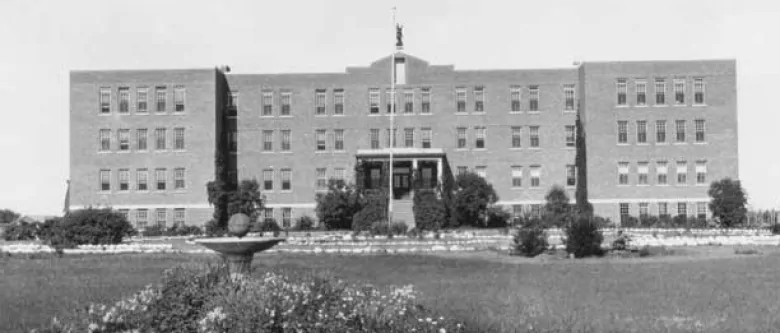Woman denied settlement for sexual assault on way to residential school because she wasn't yet a student

Therese Keenatch died at 60, two weeks after her residential school compensation claim was first rejected on grounds she wasn’t technically a student when she was sexually assaulted by a federal employee on the way to a Saskatchewan residential school.
Her daughter, June Keenatch, took up the case after her mother’s 2015 death and continued the fight all the way to the B.C. Supreme Court where she faced Justice Canada’s lawyers.
Federal lawyers argued that her mother did not qualify for compensation because she hadn’t been officially admitted at the school at the time of the assault and the federal employee was also not technically connected to a residential school — though he claimed to take children to the institutions.
Justice Brenda Brown sided with Ottawa and dismissed the case in a ruling delivered on Jan. 9.
“I don’t think that it was fair; there is no justice,” said June Keenatch.
Keenatch said her mother had six children and used a wheelchair for much of her life.
“I feel like the government is pretty racist toward First Nations people, like our lives don’t really matter,” said Keenatch, who lives in Saskatoon.
NDP MP Charlie Angus said Crown-Indigenous Relations Minister Carolyn Bennett, whose department directs Justice Canada on residential school cases, should settle with the family.
Angus said the case was one of the most glaring examples of the legal tactics federal lawyers used to defeat residential school claims.
“No one in this government has contested in any way the facts of this terrible case. Yet they denied her justice on the grounds she was raped on the way to a residential school and not on the property itself,” said Angus, in a news conference Monday.
“What we have seen, time and time again, is a government willing to use the endless resources of the justice department to wage a toxic legal war against the legal rights of survivors.”
‘This is indeed a troubling case’
Therese Keenatch was 15 when she was picked up by a guidance counsellor employed by the department of Indian Affairs while she walked in her home community of Witchekan Lake First Nation in September 1970, according to Brown’s ruling.
Therese Keenatch “knew nothing about residential schools . . . and she did not know whose idea it was for her to attend one,” according to evidence from Keenatch’s original testimony described in Brown’s ruling.
The guidance counsellor then stopped his car near the town of Kilwinning, Sask., and sexually assaulted her before moving on to drop her off at St. Michael’s residential school at Duck Lake, about 85 kilometres northeast of Saskatoon, according to Keenatch’s evidence described in the ruling.
Doug Racine, a Saskatoon lawyer with the Aboriginal Law Group, represented June Keenatch. He said the case was lost on highly technical grounds based on competing interpretations of the wording of the Indian Residential Schools Settlement Agreement (IRSSA).
“It is very, very frustrating,” said Racine, who fought the case for free.
“The courts sometimes are ill-equipped to deal with the trauma and justice in the sense of doing what is right. This was a technical decision.”
Therese Keenatch’s claim was rejected repeatedly by the Independent Assessment Process (IAP) created by the IRSSA to provide compensation for abuse suffered at the institutions.
The B.C. Supreme Court case hinged on whether the IAP adjudicators erred in their decisions.

Brown said in her ruling that compensation could still be sought from the government through another legal channel.
“This is indeed a troubling case, and a troubling outcome,” wrote Brown, who is a supervising judge for the IRSSA.
“But as the initial adjudicator noted, the finding that no compensation could be granted under the IAP for this very serious sexual assault in no way precluded pursuing the claim through other means.”
MP says Ottawa’s handling of settlement needs review
June Keenatch said she is done fighting.
“I just pretty much gave up,” she said.
“This has been going on for a long time now.”
Crown-Indigenous Relations Minister Carolyn Bennett’s office said in a statement that what happened to Therese Keenatch was “horrific and inexcusable.” The statement said the government is committed to resolving all claims, even if they fall outside the negotiated terms of the residential schools settlement agreement.
“Minister Bennett has directed departmental officials to identify other possible means for appropriate resolution as the Government of Canada does not dispute these allegations,” said the statement.
“Minister Bennett has also directed the department to investigate to ensure appropriate resolution of similar claims.”
Angus said the Crown-Indigenous Relations minister should never have fought this case.
“She needs to come clean with Canadian people. What does reconciliation mean in her government when they take positions like this?” he said.
Angus said the case is just another example of how federal lawyers used technical arguments to defeat residential school cases throughout the settlement process. He said a parliamentary committee needs to review how Ottawa handled the IRSSA.
“We may never know how much of these cases were falsely adjudicated. I think a fair thing, now that this process is coming to an end, would be to learn lessons from it,” he said.
According to the latest statistics available on the Indian Residential Schools Adjudication Secretariat’s website, as of Dec. 31, 2019 a total of 99 per cent of the over 38,000 claims filed have been resolved and close to 90 per cent of IAP claimants have received compensation under the IAP. Only 13 claims remain in progress, nine of which are at the post-hearing stage.





